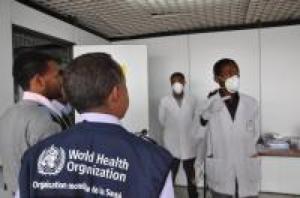WHO and Partners Come Together to Reinforce Ebola Preparedness in High Risk Countries
The evolving Ebola Virus Disease (EVD) outbreak highlights the risk of cases being imported into unaffected countries. WHO’s preparedness activities aim to ensure that all countries are ready to effectively and safely detect, investigate and report potential EVD cases, and to mount an effective response. Ethiopia is among the high priority countries for WHO and partners’ support due to the volume of travellers arriving to and transiting in Addis Ababa every day.
A consultative meeting between WHO and partners on EVD preparedness and readiness of high risk countries took place in Geneva, 14-16 January 2015. An in-depth review of the consolidated checklist for Ebola Preparedness was conducted during the meeting to identify and highlight key gaps and areas to be addressed, including community engagement, infection prevention and control, contact tracing and logistics. A dashboard which allows partners to accurately target needs and gaps was also presented. The dashboard will be used to support in-country preparedness efforts by national authorities. In line with the WHO and partners’ support to high risk countries, an external Ebola Virus Disease Preparedness Assessment was conducted in Ethiopia, 2-8 December 2014, and a 90-day plan was developed for the country. In the coming months, WHO will organize a follow-up mission to assess progress against 90-day plan, conduct simulation exercises in collaboration with partners and identify areas for improvement.
During the second week of January, Ethiopia had real-time drill of its Ebola preparedness and response plan when a suspected/ probable case was notified by the Federal Ministry of Health on 13 January 2015. The patient was a health worker who supported Ebola response activities in Sierra Leone. After about two weeks of his arrival to Addis Ababa he became seriously ill and was admitted to a hospital and later on the same day transferred to the EVD treatment centre for further investigation. The patient was diagnosed as having malaria, but a sample was sent to NICD laboratory in South Africa to confirm that the case was not Ebola. Until the sample was confirmed as negative, the patient's contacts were kept in quarantine in their respective houses. Although this event demonstrated Ethiopia's strong capacity to respond to a probable Ebola case, it also helped to identify opportunities for improvement in the country's preparedness. WHO and partners continue their support to strengthen the country's Ebola preparedness and capacity to adequately respond to possible cases.
For more information, please contact Dr Kebba O’Jaiteh, Outbreak, Crisis and Response Coordinator, WHO Ethiopia; Email: jaitehk [at] who.int (jaitehk[at]who[dot]int)
Photo: WHO Ethiopia/ Viivi Erkkila



